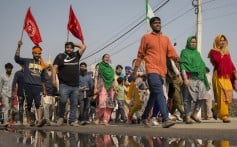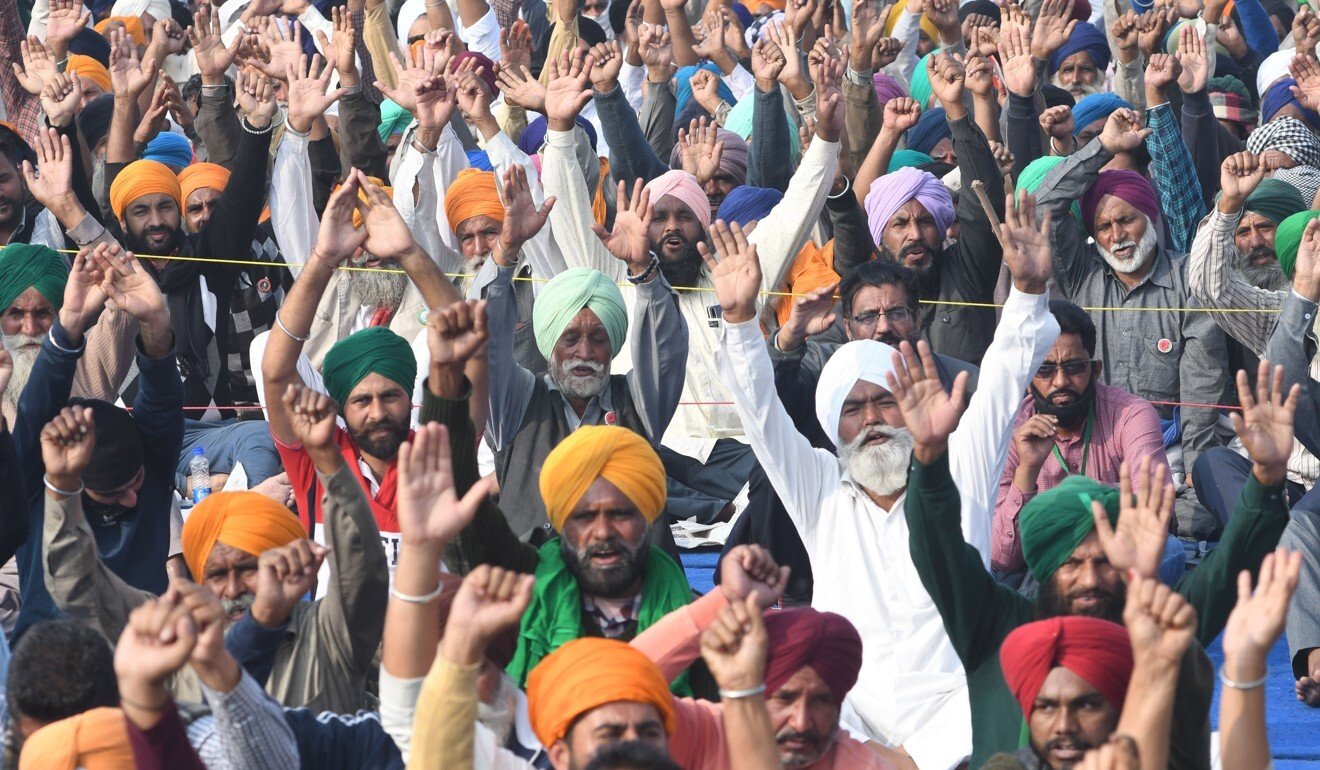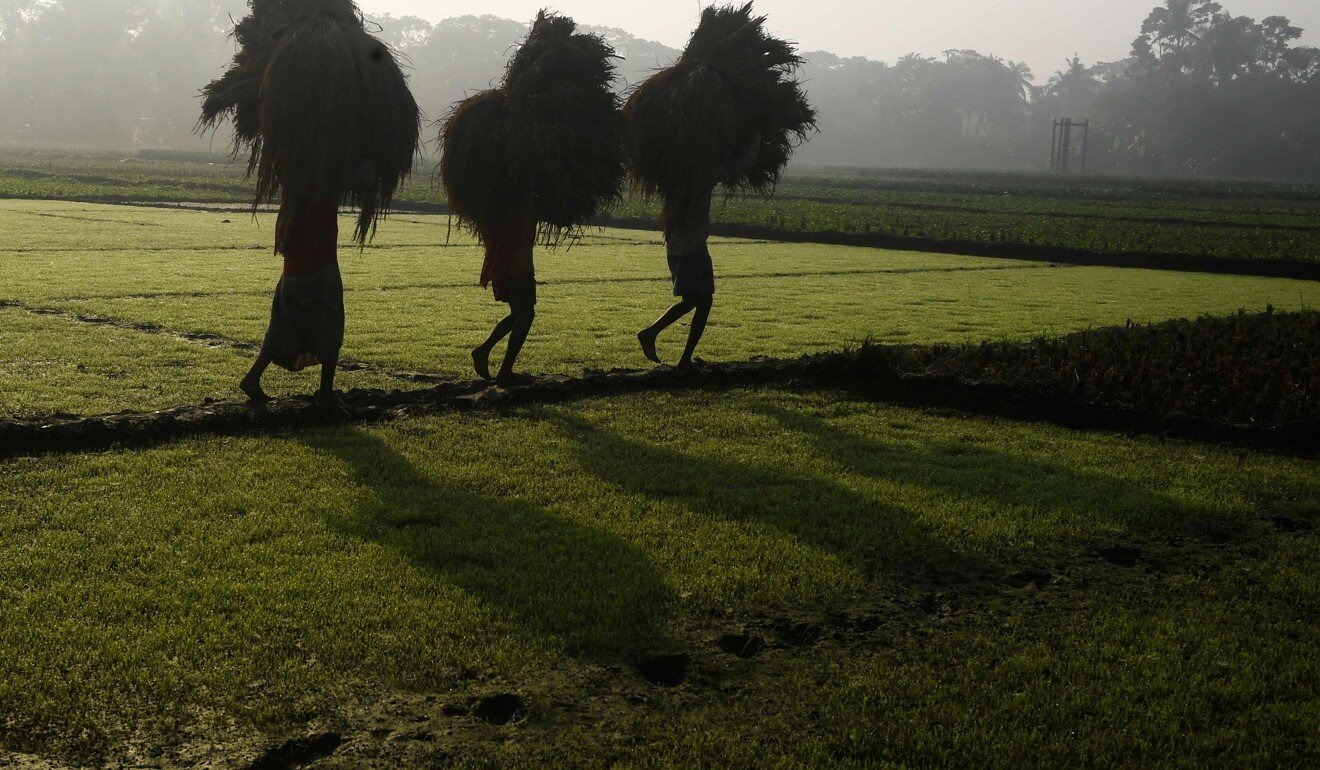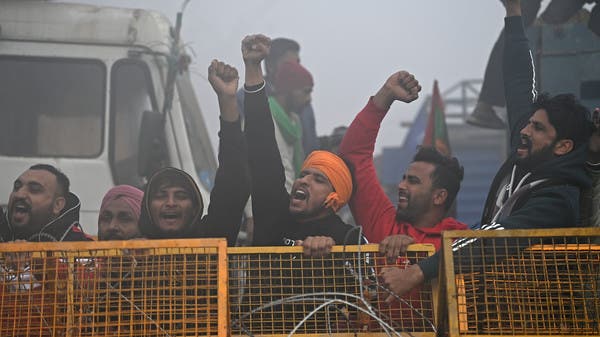Farmer unions in India have called for a general strike over new agricultural laws that are aimed at liberalizing the industry. The nationwide shutdown comes a day before talks with the government.

Indian farmers called for a one-day nationwide strike on Tuesday after days of blockading New Delhi in a bid to force the government to repeal its new market-friendly farm laws.
Tuesday's strike, called Bharat Bandh, will see tens of thousands of farmers blocking key roads and rail lines across the country for several hours, affecting transport services and offices.
They have received support from railway workers, truck drivers and other unions, who will be joining them in the strike.
The farmers have emphasized that the strike will be a peaceful protest, and they will ensure that emergency services such as ambulances and fire brigades aren't affected.
"Our protest is peaceful, and we'll continue that way. Bharat Bandh is a symbolic protest to register our opposition. It is to show that we don't support some of the policies of the government," farmers' union leader Rakesh Tikait told reporters.
Read more: India farmers threaten Delhi blockade in protest of Modi's agriculture reforms
The strike comes after five rounds of talks between farmers' unions and the government failed. The sixth round of talks is scheduled for Wednesday.
Tens of thousands of farmers have camped near the border of New Delhi since November 27 to protest the new laws, blocking most of the entry points to the national capital.
The farmers have said they will not return home until the laws are repealed.
The Indian government issued an advisory to all states and union territories to boost security. Thousands of extra police personnel have been deployed in Delhi and neighboring states where farmers have been protesting for nearly two weeks.
VIDEO India: Farmers demand repeal of agricultural market reforms
What are the laws they are protesting?
In September, India's parliament passed three controversial agriculture bills aimed at liberalizing the country's farm sector. They were subsequently signed into law, sparking farmers' protests across the country.
The government argued that the new laws will give freedom to farmers to sell their produce outside regulated markets and enter into contracts with buyers at a pre-agreed price.
The ruling Bharatiya Janata Party (BJP) insists that the laws will fetch better prices and free farmers from traditional middlemen who dominate the trade. The government hopes that its new policy will double farmers' income by 2022.
Farmers' associations say the legislation does not guarantee the acquisition of farm produce through state-run organizations that guarantee a minimum support price (MSP), thus leaving them at the mercy of corporations that are now expected to enter the country's troubled farming sector.
"We are fighting for our rights. We won't rest until we reach the capital and force the government to abolish these black laws,'' said Majhinder Singh Dhaliwal, a farmers' leader.
Opposition parties and even some allies of Prime Minister Narendra Modi have called the laws anti-farmer and pro-corporation and called on the government to accept the farmers' demand to roll them back.

Protesters from the Left Front political party blocked railways in Kolkata
Domestic and international support for farmers
More than 15 opposition parties and many non-BJP-ruled state governments have backed the strikes. The government has accused Congress, the main opposition party, of opportunism.
Union Minister Ravi Shankar Prasad said Congress supported privatizing the agricultural sector but is now opposing it to gain favor with the farmers, an influential voting group.
The farmers have also received support internationally. Several US lawmakers have voiced their support for the ongoing protests.
"I stand in solidarity with the Punjabi farmers in India protesting for their livelihoods and protection from misguided, manipulative government regulations," Congressman Doug LaMalfa said on Monday.
"Punjabi farmers must be allowed to protest peacefully against their government without fear of violence," the Republican said in a tweet.
Canadian Prime Minister Justin Trudeau also reiterated his support of Indian farmers last week.
Trudeau released a Twitter video calling the police crackdown on the farmer protests "concerning" and saying they should be allowed to stage peaceful protests.
"Canada will always stand up for the right of peaceful protests anywhere around the world. And we are pleased to see moves towards de-escalation and dialogue," he told reporters in Ottawa.

INDIAN FARMERS CONTINUE PROTEST AGAINST NEW DELHI
Talks inconclusive
Farmers from the northern state of Punjab sit in protest at the border between Delhi and Haryana amid an ongoing deadlock with the national government.
PHOTOS 12345678
More than 15 opposition parties and many non-BJP-ruled state governments have backed the strikes. The government has accused Congress, the main opposition party, of opportunism.
Union Minister Ravi Shankar Prasad said Congress supported privatizing the agricultural sector but is now opposing it to gain favor with the farmers, an influential voting group.
The farmers have also received support internationally. Several US lawmakers have voiced their support for the ongoing protests.
"I stand in solidarity with the Punjabi farmers in India protesting for their livelihoods and protection from misguided, manipulative government regulations," Congressman Doug LaMalfa said on Monday.
"Punjabi farmers must be allowed to protest peacefully against their government without fear of violence," the Republican said in a tweet.
Canadian Prime Minister Justin Trudeau also reiterated his support of Indian farmers last week.
Trudeau released a Twitter video calling the police crackdown on the farmer protests "concerning" and saying they should be allowed to stage peaceful protests.
"Canada will always stand up for the right of peaceful protests anywhere around the world. And we are pleased to see moves towards de-escalation and dialogue," he told reporters in Ottawa.

INDIAN FARMERS CONTINUE PROTEST AGAINST NEW DELHI
Talks inconclusive
Farmers from the northern state of Punjab sit in protest at the border between Delhi and Haryana amid an ongoing deadlock with the national government.
PHOTOS 12345678
India’s farmers launch nationwide shutdown against new agricultural reform laws
Farmers have vowed to block major roads and rail lines across the country and have been given support by railway workers, truck drivers and teachers
They want laws they say will force produce prices down to be repealed, but which the government insist are necessary for agriculture’s long-term future
Agence France-Presse in New Delhi
Published: 8 Dec, 2020
Indian farmers threaten weeks of protests as talks with government continue
Indian farmers who have been blockading New Delhi on Tuesday launched a one-day, nationwide general strike to push their demands for the government to repeal reform laws opening up trade in agricultural produce.
Tens of thousands of farmers have been camped on the outskirts of the capital since November 27
Rakesh Tikait, a protest leader, said that people should not travel during the shutdown and all stores should close.
Thousands of Indian farmers protest against market reforms as government talks fail to ease anger
Balbir Singh Rajewal, another leader, said: “We want nothing less than a withdrawal of the new farm laws.”
The main opposition Congress party and about 15 other political groupings are backing the protest but the government has accused them of opportunism, rejecting measures that they had called for when in power.
The farmers are strongest in the north of the country, but even the government in the southern state of Karnataka suspended online school lessons for the day to show support.
Indian farmers vs Modi: protesters ‘ready to die’ in winter of discontent
4 Dec 2020

Top athletes including wrestler Kartar Singh, who won gold medals at the Asian Games in 1978 and 1986, said they would return national awards in protest at the laws.
Singh alongside hockey player Gurmail Singh – gold medallist at the 1980 Moscow Olympics – and former women’s hockey captain Rajbir Kaur tried to march on the presidential palace on Monday to hand back awards but were stopped by police.
A new round of talks on the disputed laws are to be held on Wednesday.
Farmers have vowed to block major roads and rail lines across the country and have been given support by railway workers, truck drivers and teachers
They want laws they say will force produce prices down to be repealed, but which the government insist are necessary for agriculture’s long-term future
Agence France-Presse in New Delhi
Published: 8 Dec, 2020
Indian farmers threaten weeks of protests as talks with government continue
Indian farmers who have been blockading New Delhi on Tuesday launched a one-day, nationwide general strike to push their demands for the government to repeal reform laws opening up trade in agricultural produce.
Tens of thousands of farmers have been camped on the outskirts of the capital since November 27
in protest at the laws in what has become one of the biggest challenges to the Hindu nationalist government since it won a second landslide election in 2019.
Farmers have vowed to block major roads and rail lines across the country for several hours and have been given support by railway workers, truck drivers, teachers and other unions.

Farmers react after police tried to stop them from entering New Delhi to protest against new farm laws on Monday. Photo: EPA
Authorities have put thousands of extra police on the streets in Delhi and boosted security in the rest of the country in a bid to head off any trouble.
Five rounds of talks have failed to narrow differences between farmers and ministers. The growing numbers of farmers and their supporters camped outside the capital say they will not go home until the laws are repealed.
The laws will allow farmers to sell their produce on the open market – including to supermarket chains – instead of being forced to sell through state-run organisations that guarantee a minimum price.

Farmers carry crops after harvesting a field on the outskirts of Kolkata earlier this month. The government insists reforms are necessary to give Indian agriculture a long-term future. Photo: AFP
Farmers say the industry will be taken over by major firms who will force prices down. The government insists the changes are necessary to give agriculture – still the backbone of the Indian economy – a long-term future.
The protests have already caused price rises for fruit and vegetables in Delhi because supplies are restricted.
Farmers have vowed to block major roads and rail lines across the country for several hours and have been given support by railway workers, truck drivers, teachers and other unions.

Farmers react after police tried to stop them from entering New Delhi to protest against new farm laws on Monday. Photo: EPA
Authorities have put thousands of extra police on the streets in Delhi and boosted security in the rest of the country in a bid to head off any trouble.
Five rounds of talks have failed to narrow differences between farmers and ministers. The growing numbers of farmers and their supporters camped outside the capital say they will not go home until the laws are repealed.
The laws will allow farmers to sell their produce on the open market – including to supermarket chains – instead of being forced to sell through state-run organisations that guarantee a minimum price.

Farmers carry crops after harvesting a field on the outskirts of Kolkata earlier this month. The government insists reforms are necessary to give Indian agriculture a long-term future. Photo: AFP
Farmers say the industry will be taken over by major firms who will force prices down. The government insists the changes are necessary to give agriculture – still the backbone of the Indian economy – a long-term future.
The protests have already caused price rises for fruit and vegetables in Delhi because supplies are restricted.
Rakesh Tikait, a protest leader, said that people should not travel during the shutdown and all stores should close.
Thousands of Indian farmers protest against market reforms as government talks fail to ease anger
Balbir Singh Rajewal, another leader, said: “We want nothing less than a withdrawal of the new farm laws.”
The main opposition Congress party and about 15 other political groupings are backing the protest but the government has accused them of opportunism, rejecting measures that they had called for when in power.
The farmers are strongest in the north of the country, but even the government in the southern state of Karnataka suspended online school lessons for the day to show support.
Indian farmers vs Modi: protesters ‘ready to die’ in winter of discontent
4 Dec 2020

Top athletes including wrestler Kartar Singh, who won gold medals at the Asian Games in 1978 and 1986, said they would return national awards in protest at the laws.
Singh alongside hockey player Gurmail Singh – gold medallist at the 1980 Moscow Olympics – and former women’s hockey captain Rajbir Kaur tried to march on the presidential palace on Monday to hand back awards but were stopped by police.
A new round of talks on the disputed laws are to be held on Wednesday.

Farmers shout slogans next to a police barricade amid foggy condition during a nationwide general strike to protest against the recent agricultural reforms at the Delhi-Haryana state border in Singhu on December 8, 2020. (AFP)
No comments:
Post a Comment